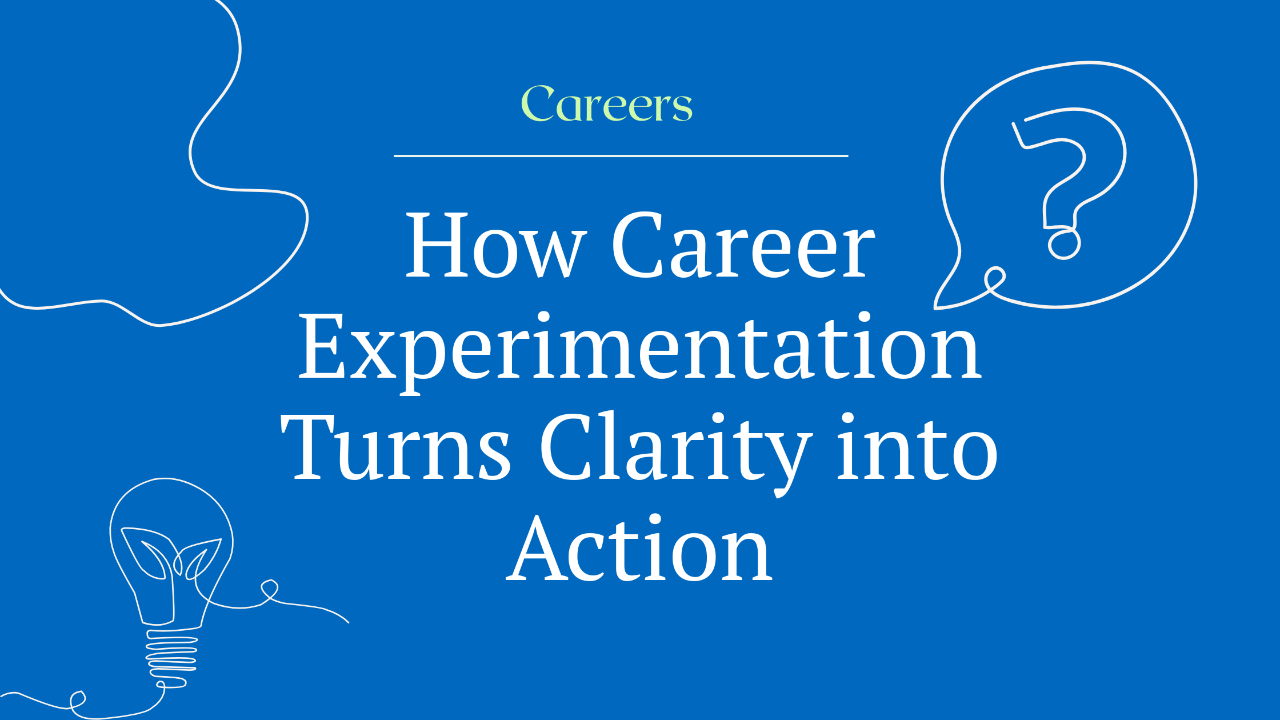🚀 From Dreaming to Doing: How Career Experimentation Turns Clarity into Action
May 14, 2025
We spend a lot of time on the “what ifs.”
What if I stayed in my current job?
What if I took a leap into that dream career I’ve been quietly researching?
What if I tried something bold, but failed?
When I was pivoting from a traditional path into the world of product, strategy, and coaching, I was juggling all of these questions.
I had the dreams, the reflections, the meditation cushions—and yet, I was stuck.
That’s where experimentation changed everything.
Instead of waiting for the perfect answer or a sign from the universe, I decided to test my hypotheses the same way I would test a product.
It felt weirdly logical but deeply spiritual too—what if I just tried the path, instead of overthinking it?
A New Way to Navigate Career Change: Experimentation
You’ve done the dreaming. Now it’s time to do.
This is where you use experimentation not just as a strategy, but as a spiritual practice of curiosity and courage.
The key is approaching your life with the same mindset as a scientist or product designer: make a hypothesis, run an experiment, learn from the results, and refine.
Step 1: Set a Career Hypothesis
What do you think will happen if you follow this path?
Example Hypothesis:
"If I stay in my current job for another year, I’ll get promoted, have more impact, and feel a greater sense of purpose."
Follow-up:
-
What if this is false? → I’ll explore roles at smaller mission-driven companies.
-
What if this is true? → I’ll reassess my long-term goals and create new growth milestones.
The clearer your hypothesis, the easier it is to act and adjust.
Step 2: Make It Measurable
Instead of saying, "I want to try product design," say:
"Over the next 3 months, I’ll do a freelance design project, attend 2 meetups, and apply to 10 jobs. If I enjoy the work and land interviews, I’ll continue. If not, I’ll pivot."
This gives your career questions real-world edges.
And it moves you out of passive action (watching videos, journaling, thinking) into embodied action.
Step 3: Set a Timeframe for Evaluation
According to behavioral scientists Amos Tversky and Eldar Shafir, deadlines matter more than we think.
When given a 5-day deadline, 66% of students completed a task; with no deadline, only 25% followed through.
Your career is no different. Give your experiment an end date—90 days, 6 months, one year—then pause to reflect:
-
What did I learn?
-
Did I enjoy it?
-
What were the challenges?
-
What will I do differently next?
Step 4: Build Experiments Around Real-Life Actions
Here’s where it gets personal.
Here are a few experiments I’ve run:
👉🏽 Helped a friend launch their coaching website to test how I’d feel doing freelance UX work.👉🏽 Joined a PM Slack group and offered help for free to test my skills in a new environment.
👉🏽 Mentored career switchers to see if I enjoyed coaching as much as I thought (I did!).
All of these were low-stakes, high-learning experiments.
Other Experiment Ideas:
👉🏽 Volunteer for a startup in your dream industry👉🏽 Offer a free workshop or resume review to your network
👉🏽 Build a portfolio project or case study to test your creativity
Step 5: The Experimentation Exercise
Use this to move from analysis to action:
1️⃣ What’s your current hypothesis?
Example: If I pursue product marketing roles, I’ll feel more energized and creative.
2️⃣ What would you need to test this?
-
Informational interviews
-
Freelance project
-
A side hustle in the same field
3️⃣ What’s your timeline?
-
30 days? 90 days? 6 months?
4️⃣ What happens if…
-
It works?
-
It doesn’t?
5️⃣ What do you need to learn?
-
What skills do you need to build?
-
Who do you need to talk to?
Nothing is Wasted: Success Stacks
In Buddhism, each moment is a stepping stone, each breath an opportunity.
Your experiments are no different. Whether or not a path works out, you grow.
The person who launches a startup and then closes it down is not back at square one.
They now know how to talk to customers, manage risk, and build from scratch.
This is what researchers call "transferable capital"—experiences and learnings that move with you.
Closing Reflection
In Eastern philosophy, we are often reminded to walk the middle path—not rigid, not reckless.
This is what experimentation gives us the courage to try without attachment to outcomes. The wisdom to fail forward. The humility to adjust.
If you’ve been stuck between two options—your current job and a bold new dream—start experimenting today. Not tomorrow. Today.
Because action, not clarity, is what ultimately creates momentum.
And that dream life? You’ll never know if it’s for you until you try.
Welcome to Ambition Redesigned! Where purpose meets progress.
Get one actionable tip delivered to your inbox every Monday.


